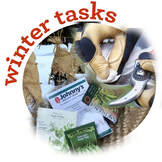
Winter horticultural hints from Betty Sanders Don’t wait to order seeds. Last spring, seed companies found themselves overwhelmed by orders from people wanting to start vegetable gardens amid pandemic shutdowns and shelter-in-place orders. Anyone who waited to order found not just their favorite seed varieties sold out, but also second- and third choices. Despite assurances they were increasing orders from their suppliers, a quick check in late November showed many favorite seed varieties are ‘not available at this time’. Don’t wait until the new year to put in your order; do it now. December is also the time to plant seeds for hardy annuals that need a winter outside to germinate, such as cleome, bachelor buttons, snapdragons, snow on the mountain and, for next year’s monarch butterflies, milkweed. Protect against freeze and thaw. Winter is tough on your perennials and bulbs, but it isn’t the cold that poses the greatest danger. Instead, it’s the freeze-and-thaw cycle of early and late winter that can – quite literally – pop plants out of the ground. Once the ground is frozen in your perennial beds and over bulb plantings, add a layer of straw, pine needles or (better yet) branches cut from evergreens that will not pack down over the winter. Evergreens should be mulched with a heavy layer of straw or leaves to protect the roots. In January, the branches can provide protection for low growing plants that might otherwise be crushed or broken by snow. Also, when putting up (and taking down) outdoor Christmas lights on trees and shrubs, take care not to break off the buds that will be next spring’s flowers. |
Protect your shrubs. Any plant that regularly fails to thrive after a tough winter needs extra protection. You can use many of the same techniques that work for roses, for spring flowering hydrangeas that fail to bloom, as well as not-quite-hardy shrubs. Plants susceptible to branch break from heavy snow need special help. Tying branches together with heavy twine can be effective. For small plants, slatted structures allow good air flow while preventing crushing snow loads from building up. While you may see others doing so, resist the temptation to tightly wrap trees or shrubs with burlap. Burlap provides good shelter for rodents and other animals while preventing the plant from receiving sunlight throughout the winter. Protect against Thumper and friends. Newly planted trees and fruit trees are magnets for hungry rabbits and rodents whose regular food supply is substantially reduced by the onset of winter. Wrap vulnerable trees and shrubs with wire mesh or heavy paper to make those plants harder to get to.
Winterize your tools. Outdoor gardening season is over, so now it’s important to clean and organize your gardening equipment. Send your mower in for service (you won’t care if it’s not ready for three months). Wash the dirt off shovels, rakes and trowels. Then remove any rust with a piece of steel wool. Finish with by rubbing on a light coating of oil on all metal parts. Clean and sharpen edges pruners, loppers and other cutting tools. In the spring you’ll be glad you are ready to start gardening with like-new tools. Let them rest. Stop fertilizing houseplants until next February – unless you keep them under lights. Houseplants need regular misting during winter months to prevent damage from the dry air in our homes. Or you can place pots on saucers or trays with a layer of stone. If the stones are kept wet, the evaporating water will add humidity without risking root rot in your plants With late autumn and winter’s lower light levels, houseplants enter a resting phase. It will also help your houseplants if you keep your home on the cooler side (or place plants in a cooler room) and keep your houseplant’s leaves clean. Break the salt habit. Home improvement and hardware stores are filled with bags of salt-based de-icers for your sidewalk and driveway. Leave them be. Instead, use sand to make your sidewalk and driveway safe. Why avoid salt? Because it will cause serious damage your lawn or plantings along the pavement. Also, while sometimes recommended, using fertilizers as de-icing agents leads to over-fertilizing and can kill plants and lawns. You can read more of Betty's horticultural advise on her website, www.BettyOnGardening.com. She is a lifetime Master Gardener. |
Videos from fellow Member, Matt Martin
|
|
|
|
|

